17
Travel Medication Plans: How to Manage Time Zones, Storage, and Side Effects
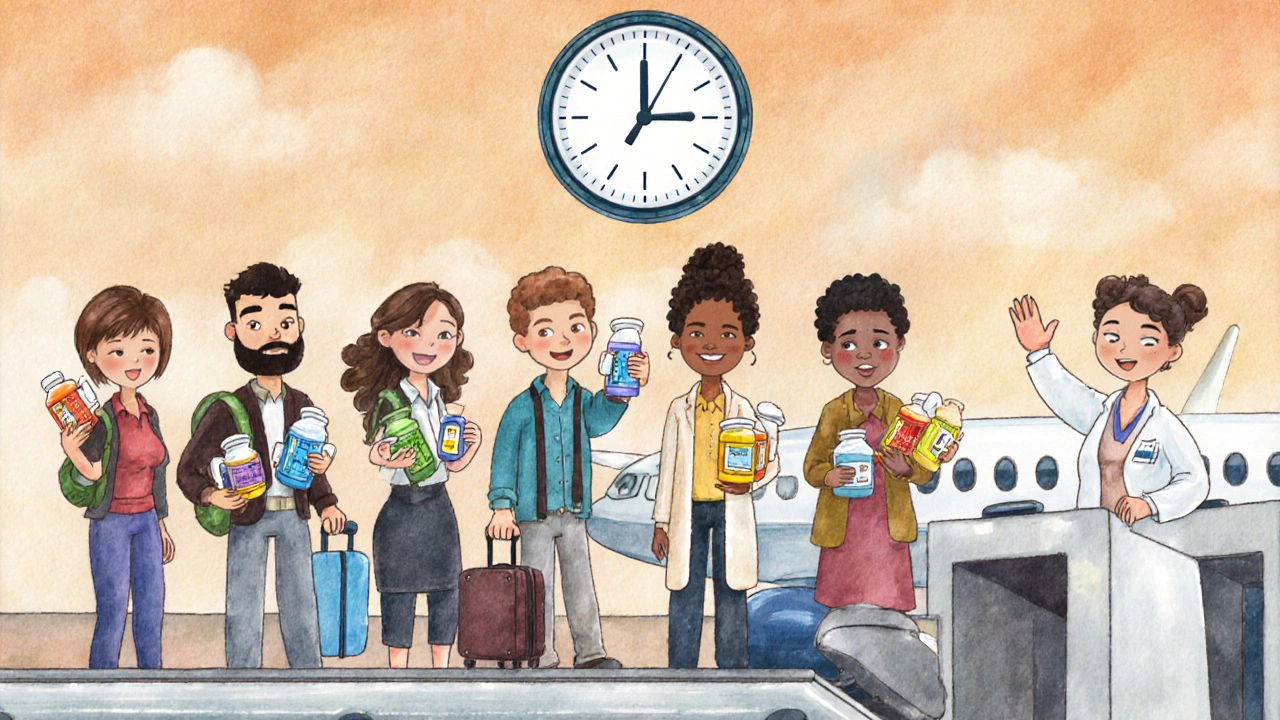
Travel Medication Time Zone Calculator
Your Current Schedule
Destination Information
Adjusted Medication Schedule
The time zone difference between your current location and destination is . The calculator has adjusted your schedule accordingly.
Why Your Medication Schedule Falls Apart When You Travel
You’ve packed your clothes, booked your hotel, and printed your boarding pass. But have you thought about when you’ll take your pills? Crossing time zones isn’t just about jet lag-it can throw your entire medication routine into chaos. Missing a dose of blood pressure medicine, taking an antiretroviral two hours late, or letting insulin sit in a hot airport locker isn’t just inconvenient. It can be dangerous.
More than 40% of travelers who take daily medication report at least one medication-related issue while abroad, according to a 2022 TripAdvisor survey. For seniors, that number jumps to 73%. The problem isn’t always forgetting. It’s confusion. Is it 8 a.m. back home or 2 a.m. here? Should you take your pill before or after that long flight? And what if your insulin gets too hot?
The good news? You don’t have to guess. With the right plan, you can avoid side effects, keep your meds safe, and stay on schedule-even when you’re halfway around the world.
Time Zone Adjustments: When to Take Your Pills
There’s no one-size-fits-all rule for adjusting medication timing across time zones. It depends on what you’re taking and how strict the dosing window is.
For most people, the simplest and safest approach is to switch to the destination time zone immediately. If you’re flying from London to Tokyo (8-hour difference), start taking your pills according to Tokyo time as soon as you board the plane. This avoids the mental load of juggling two clocks and reduces the chance of double-dosing or missing a pill.
But some medications need tighter control. Take antiretrovirals, for example. Drugs like dolutegravir (used for HIV) must be taken within a 1-hour window. If you’re on this regimen, shifting your schedule gradually-moving your dose 1 hour earlier or later each day for a few days before travel-can help your body adjust. One study showed this reduced side effects by 37%, but it also increased the risk of missing a dose by 22%. For most, the immediate switch is still safer.
Contraceptive pills are another area where timing matters. Combined pills (estrogen + progestin) have a 12-hour window. Progestin-only pills? Only 3 hours. Go past that, and effectiveness drops. If you’re on the mini-pill and flying east across 5+ time zones, it’s smarter to adjust your dose to local time right away. Don’t wait until you land.
Antihypertensives can cause spikes in blood pressure during the first 72 hours after a time zone change. Statins, on the other hand, are forgiving-you can take them up to 4 hours off schedule without losing effectiveness. Know your meds. If you’re unsure, ask your pharmacist or doctor. Don’t assume all pills work the same way.
Storage: Keeping Your Meds Safe in Heat, Cold, and Chaos
Medications aren’t just pills in a bottle. They’re chemicals that can break down if exposed to heat, humidity, or light.
Insulin is the most fragile. It needs to stay between 2°C and 8°C (36°F-46°F). If you’re traveling to a tropical destination and your hotel doesn’t have a fridge, use a small insulated travel cooler with ice packs. Never leave it in the car or checked luggage. The CDC says 23% of common medications are light-sensitive. If your pill bottle is clear, transfer it to an opaque container. A dark pill case or even a wrapped towel will do.
Most oral tablets and capsules should be kept below 30°C (86°F) and away from humidity above 65%. That means no bathroom cabinets. No hot car trunks. No sunlit beach bags. Even a few hours in direct sunlight can weaken antibiotics, thyroid meds, or antidepressants.
Always pack meds in your carry-on. Checked bags can sit in unpressurized cargo holds where temperatures drop below freezing or soar past 50°C. One traveler in Thailand lost her entire supply of diabetes meds when her suitcase was delayed for three days in a hot warehouse. She ended up in the ER.
Keep original containers. Airlines and customs officials require them. If you’re carrying more than a 30-day supply, bring a letter from your doctor listing your medications, dosages, and why you need them. Some countries, like Japan and the UAE, ban or restrict common U.S. medications-including certain painkillers, ADHD drugs, and sleep aids. Check the embassy website of your destination before you go.
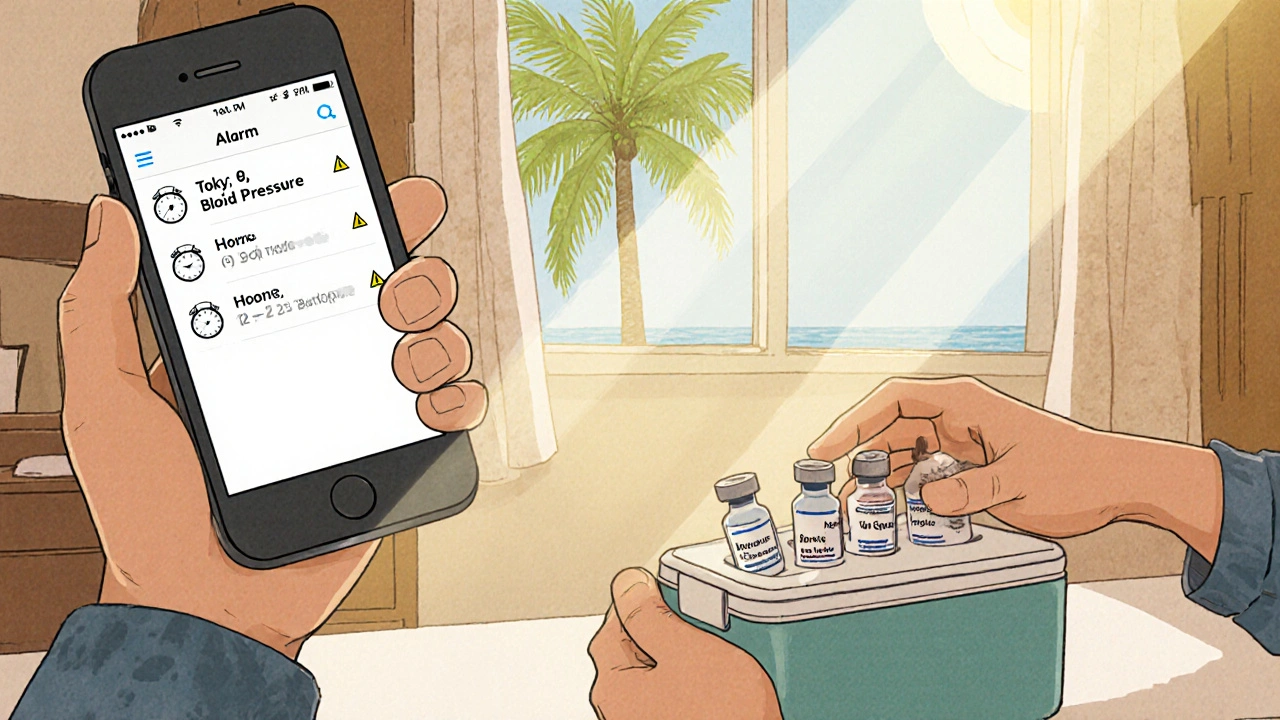
Side Effect Prevention: What to Watch For and How to Avoid It
Side effects from medication mishandling aren’t always obvious. You might feel dizzy, nauseous, or unusually tired-but you blame it on jet lag. That’s dangerous.
Missing a dose of blood thinners like warfarin can increase clot risk. Taking it too close to a meal can reduce absorption. Antiretrovirals can cause liver stress if taken inconsistently. Contraceptives can trigger breakthrough bleeding or even pregnancy if the window is missed.
The biggest risk isn’t the time zone-it’s the cascade of missed doses that follows. A 2022 CDC study found that travelers who didn’t plan ahead were three times more likely to skip pills because they were confused, tired, or distracted.
Here’s how to prevent it:
- Use a pill organizer with compartments for morning, afternoon, evening, and night. Color-code them.
- Set three alarms on your phone: one for your local time, one for home time, and one as a backup. Label them clearly: “Tokyo: 8 a.m. Blood Pressure.”
- Download a medication app like Medisafe or MyTherapy. Both are endorsed by the CDC and have built-in time zone adjusters. Users saw a 42% improvement in adherence during travel.
- Never skip a dose unless your doctor says to. If you miss one, call your provider immediately. Don’t guess.
For seniors on multiple meds, the cognitive load is real. A 2022 study found 28% higher mental strain when managing 4+ medications across time zones. If you’re over 65, consider asking a travel companion to help with alarms or pill checks. It’s not a sign of weakness-it’s smart planning.
How to Plan Ahead: A Step-by-Step Checklist
Don’t wait until the day before your trip. Start at least 4-6 weeks out. Here’s what to do:
- Book a travel medicine consultation. Talk to your doctor or pharmacist. Bring your itinerary, medication list, and any recent lab results. Ask: “How should I adjust my doses for this trip?”
- Get a written plan. Don’t rely on memory. Ask for a printed or digital schedule showing exact times in your destination time zone.
- Order extra pills. Carry enough for your trip plus 7 extra days. Delays happen. Airlines require meds to be in original containers. No exceptions.
- Pack smart. Keep all meds in your carry-on. Use a small cooler for insulin. Store pills in opaque containers if they’re light-sensitive.
- Check international rules. Visit the embassy website of your destination. Search for “prohibited medications [country name].” Japan bans 52 U.S. drugs. The UAE requires permits for 17 others.
- Set up tech reminders. Use Medisafe or MyTherapy. Sync them to your calendar. Add a second alarm on a smartwatch if you have one.
Pro tip: If you’re flying with insulin or injectables, carry a doctor’s note explaining why you need them. Security agents may ask. Having it ready saves time and stress.
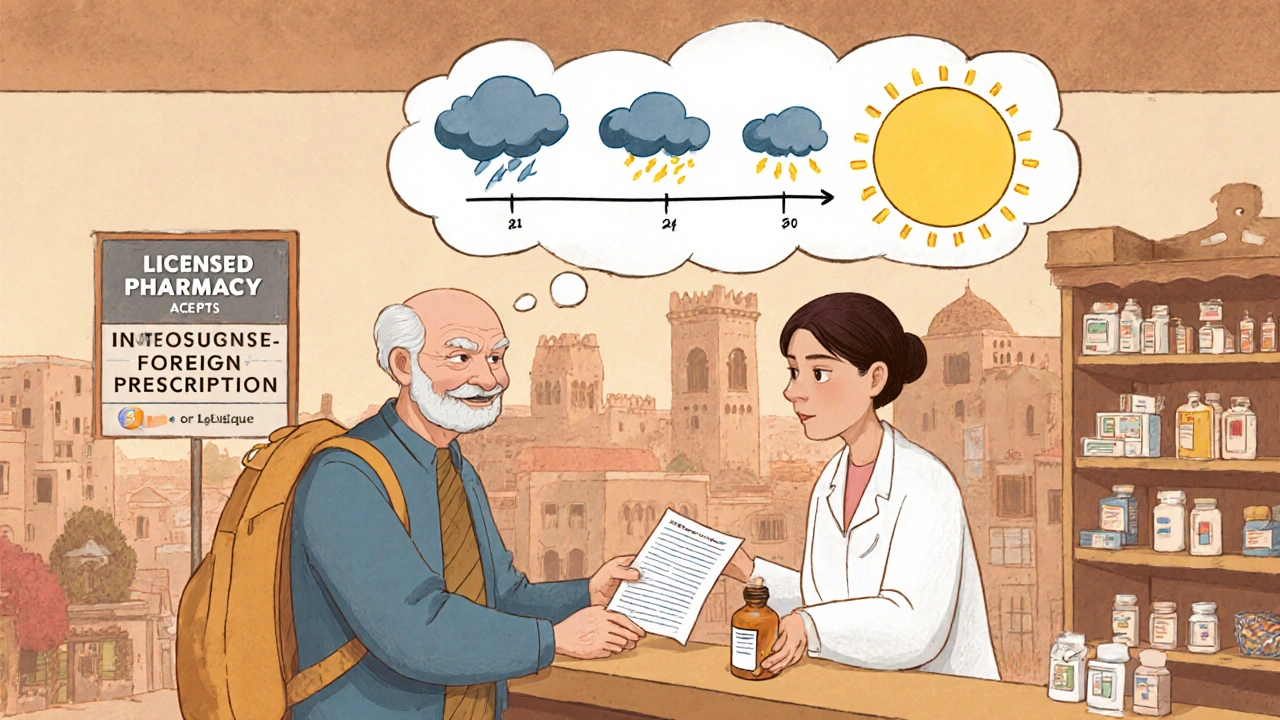
What to Do If Something Goes Wrong
Even with the best plan, things can go off track. You oversleep. Your alarm fails. Your pills get left behind.
Here’s what to do:
- Missed a dose? Check your medication’s guidelines. For most blood pressure pills, missing one isn’t an emergency-but don’t double up. For HIV meds or insulin, call your doctor or a local pharmacy immediately.
- Lost your meds? Find a local pharmacy. Show them your original prescription label or doctor’s note. Many countries can fill prescriptions from abroad, especially for chronic conditions.
- Feeling unwell? Don’t assume it’s jet lag. Could be a missed dose, a bad batch of pills, or a reaction to heat. Seek medical help. Travel insurance often covers urgent care abroad.
Keep a list of emergency contacts: your doctor’s number, your pharmacy’s number, and your insurance provider’s international help line. Save them in your phone and write them down on paper.
Real People, Real Solutions
Travelers who prepare well have fewer problems. A 2023 survey by Miusa.org found that 76% of experienced travelers use color-coded pill organizers. 89% set multiple alarms. Those who consulted a pharmacist before leaving reported 63% fewer issues.
One woman from Manchester took her diabetes meds to Bali. She used a small insulated pouch with ice packs, set three alarms, and carried her doctor’s letter. She didn’t miss a single dose.
Another man from Birmingham forgot his blood pressure pills in his checked bag. He landed in Dubai, panicked, and went to a local pharmacy. With his prescription label, they filled his script. He was fine-but he won’t forget again.
Planning isn’t about being perfect. It’s about being prepared. The difference between a smooth trip and a medical emergency is often just a few hours of preparation.
What’s Changing in Travel Medication Planning
The field is evolving. The CDC now recommends specific apps for travelers. The International Society of Travel Medicine is rolling out a new certification for pharmacies called the Travel Medication Adjustment Certificate (TMAC), expected in early 2024. AI tools are being tested to create personalized dosing plans based on your flight path and meds-early results show a 58% drop in timing errors.
Insurance companies are catching on too. Allianz Partners saw a 37% rise in travelers using their medication consultation service between 2020 and 2022. More insurers are now including it as a standard benefit.
And with more people over 65 traveling than ever before, the need for clear, personalized advice is growing. The UN says 31% of international travelers are now seniors-up from 24% in 2015. That means more focus on senior-friendly tools, simpler schedules, and better support.
You don’t need to be a doctor to manage your meds on the road. But you do need to know the basics. And now you do.
Can I take my medication on the plane?
Yes, you can-and you should. Always carry your medications in your carry-on luggage. Checked bags can be exposed to extreme temperatures or lost. Keep them in original containers with labels intact. Security may ask to see them, so don’t pack them in a sealed bag. If you’re carrying needles or insulin, bring a doctor’s note explaining why you need them.
What if I forget my pills at home?
If you forget your meds, go to a local pharmacy as soon as possible. Bring your prescription bottle or a photo of the label, and if you have one, a letter from your doctor. Many countries can fill prescriptions from abroad, especially for chronic conditions like high blood pressure or diabetes. Avoid buying medication from street vendors or unlicensed clinics. Stick to licensed pharmacies.
Are there medications that are banned in certain countries?
Yes. Japan bans 52 common U.S. medications, including some cold and allergy drugs, ADHD medications, and painkillers with codeine. The UAE requires special permits for 17 others, including certain antidepressants and sleep aids. Always check the embassy website of your destination before you travel. What’s legal at home might be illegal-or even a criminal offense-overseas.
How do I store insulin while traveling?
Insulin must be kept between 2°C and 8°C (36°F-46°F) when unopened. Once in use, it can stay at room temperature (below 30°C) for up to 28 days. Use a small insulated travel cooler with ice packs for longer trips or hot climates. Never let it freeze or sit in direct sunlight. Always carry it in your carry-on. If you’re flying, ask the flight crew if they can store it in the onboard fridge.
Should I adjust my pill schedule before I leave or after I arrive?
For most people, switch to the destination time zone as soon as you board the plane. This avoids confusion. But for strict meds like HIV drugs or progestin-only pills, a gradual shift (moving your dose 1 hour earlier or later each day for a few days before travel) may reduce side effects. Talk to your doctor about what’s safest for your specific meds.
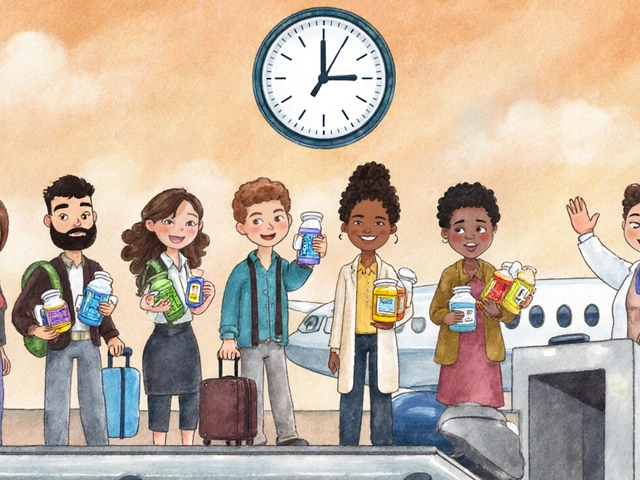

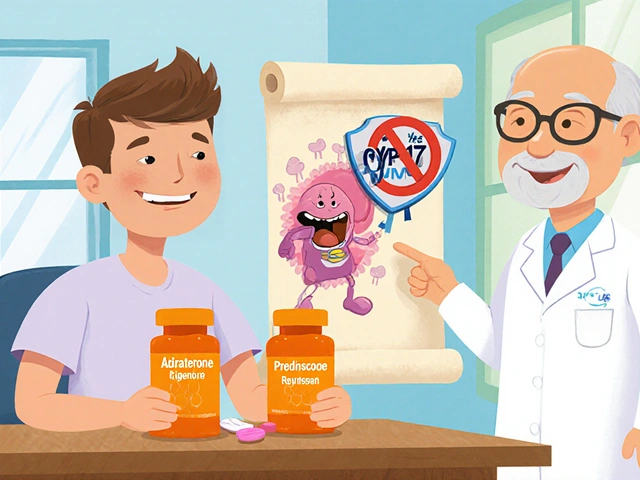






steffi walsh
November 19, 2025 AT 06:19Also, set three alarms. One for local, one for home, one for 'don't be an idiot'.
Shilpi Tiwari
November 21, 2025 AT 01:18Riohlo (Or Rio) Marie
November 22, 2025 AT 00:38Christine Eslinger
November 23, 2025 AT 15:04Iska Ede
November 24, 2025 AT 05:27Leilani O'Neill
November 24, 2025 AT 19:19Shaun Barratt
November 25, 2025 AT 08:47Louie Amour
November 26, 2025 AT 20:49Kristina Williams
November 28, 2025 AT 01:35Conor McNamara
November 28, 2025 AT 02:12Katelyn Sykes
November 28, 2025 AT 18:32Gabriella Jayne Bosticco
November 28, 2025 AT 20:34Sarah Frey
November 30, 2025 AT 12:27Brenda Kuter
December 2, 2025 AT 03:04Hal Nicholas
December 3, 2025 AT 09:52